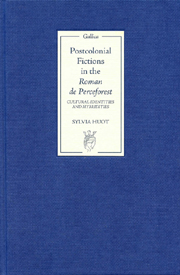Book contents
- Frontmatter
- Contents
- Acknowledgements
- Introduction
- PART I Founding Myths: Nature, Culture, and the Production of a British Kingdom
- PART II Heteronormative Sexuality and the Mission Civilisatrice
- PART III Greeks, Trojans, and the Construction of British History
- 7 Lest We Forget: The Trojan War as a Cultural Matrix
- 8 Lest We Remember: The Artifice of History
- Conclusion
- Glossary of Proper Names in Perceforest
- Bibliography
- Index
7 - Lest We Forget: The Trojan War as a Cultural Matrix
from PART III - Greeks, Trojans, and the Construction of British History
Published online by Cambridge University Press: 05 February 2013
- Frontmatter
- Contents
- Acknowledgements
- Introduction
- PART I Founding Myths: Nature, Culture, and the Production of a British Kingdom
- PART II Heteronormative Sexuality and the Mission Civilisatrice
- PART III Greeks, Trojans, and the Construction of British History
- 7 Lest We Forget: The Trojan War as a Cultural Matrix
- 8 Lest We Remember: The Artifice of History
- Conclusion
- Glossary of Proper Names in Perceforest
- Bibliography
- Index
Summary
Perceforest portrays British history as a cyclical process of cultural rise and decline, in which different groups vie for dominance: the lignaige Darnant, the lineage of Brutus as embodied in Britus and his continental descendants, the Greek dynasties established by Alexander, the Romans, and various continental peoples such as the Sicambrians and the Norwegians. Overall, most of these ethnic and cultural bids for power are subsumed within the archetypal conflict that, according to legend, determined the shape of the ancient world: that between Greeks and Trojans. And the Trojan heritage of the British knights, with its elements both of glory and of shame, is a potent but unstable matrix for the production of identity. What it means to be British is inextricably bound up with the question of what it means to be Trojan.
To a large extent, stereotypical Trojan vices are identified with the lignaige Darnant, while the positive qualities of heroism and courtly refinement are revived through the conformance of the British aristocracy to their Greek rulers. However, the situation is not really this simple. Evil though the clan may have been, the virtuous Gelinant and his luminous grandson Lyonnel stand as reminders that the lignaige Darnant did harbour potential greatness, and this potential is salvaged in both the culture and the bloodlines of the new regime. And heroic though the knights of the Franc Palais may be, numerous episodes suggest, somewhat troublingly, that stereotypical Trojan shortcomings are resurfacing along with their recovered glory.
- Type
- Chapter
- Information
- Postcolonial Fictions in the 'Roman de Perceforest'Cultural Identities and Hybridities, pp. 161 - 182Publisher: Boydell & BrewerPrint publication year: 2007



